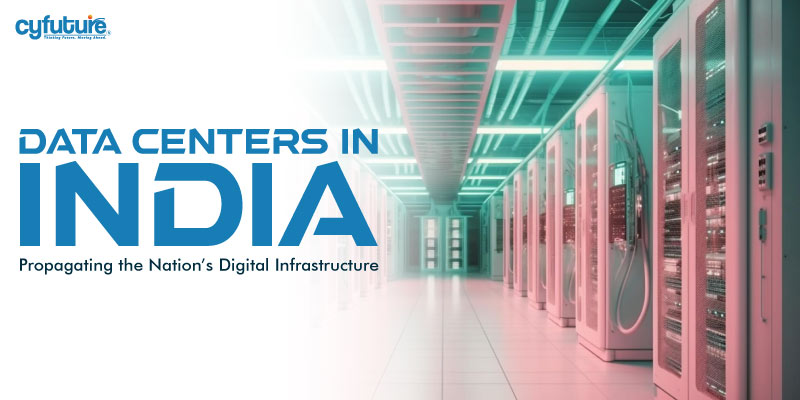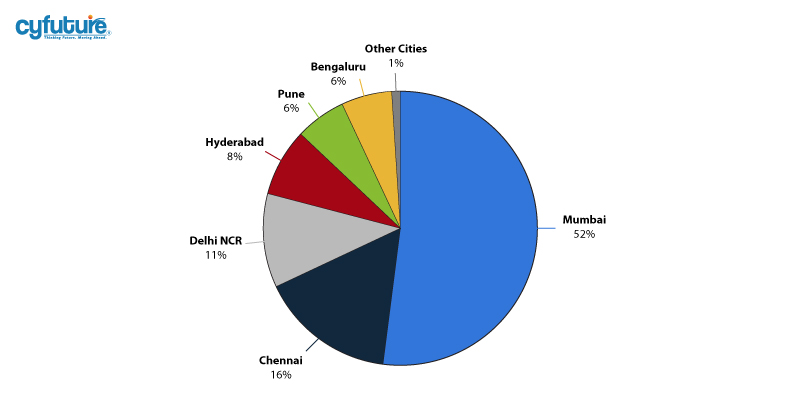-
Get Cloud GPU Server - Register Now!
Toggle navigation

Do you know that India is the 9th globally-ranked country based on data center density? Yes, you heard that right! India is showcasing vast expansion and growth in terms of IT infrastructure and competing with global giants such as the USA and Europe. As businesses around the world are growing at a rapid pace, the demand for IT infrastructure is skyrocketing. There are many players across the globe who have already entered the market, while there are a number of service providers all set to the competitive landscape. When we talk about state-of-the-art IT infrastructure, the first thing that comes to our mind is a Data Center. Data centers serve as the invisible engines powering everything from e-commerce transactions to government databases and streaming platforms. The evolution of data centers in India reflects the country’s journey towards digitalization. From traditional setups to highly sophisticated, state-of-the-art facilities, the sector has evolved rapidly to meet the growing demands of a digital-first economy.
While the demand for data centers is rapidly growing in India, there are multiple organizations setting up their facilities in various locations. However, while setting up a data center, there are multiple challenges faced by the organization. These include ensuring uninterrupted power supply, addressing skilled labor shortages, and enforcing cybersecurity measures. Despite these hurdles, the future outlook for data centers in India remains promising, with continued investments, technological advancements, and supportive government policies poised to propel the sector forward into a new era of digital innovation and prosperity. In this blog, we will dive into the basics of data centers and analyze which locations are the best for setting up data centers in India.
But before we dive into the details, let’s have a glance at some stats and data
Before delving into the specifics of data centers in India, let’s first understand what exactly a data center is and how it functions. To start with the basics, a data center is a specific facility that incorporates a network of servers, storage devices, networking equipment, and other hardware and physical components necessary for managing, storing, and processing data. These facilities can vary in size from small server rooms to massive complexes spanning thousands of square feet. Data centers play a critical role in enabling various digital services, including cloud computing, streaming media, e-commerce, and more. They provide the infrastructure needed to store and manage vast amounts of data securely, ensuring high availability and reliability for users.
Since data centers house expensive and sensitive equipment, they require the utmost physical and cybersecurity. Additionally, the servers and other equipment can generate significant heat during normal operation. Thus, effective cooling and ventilation systems are required to maintain the optimal temperature and prevent overheating. Additionally, the hardware consumes significant power so there is a requirement for continuous power supply and generators in case of power failure. All these factors are critical when setting up a data center in India.
The evolution of data centers in India can be traced back to the early 2000s when the Internet was introduced to the general public. At this point in time, India began experiencing rapid growth in internet usage and digital technologies. During this initial stage, data center infrastructure was limited, with many organizations relying on on-premises physical servers or outsourcing their hosting needs to providers abroad.
However, as internet usage further increased and the demand for digital services surged, the need for local data centers became necessary. This led to the emergence of domestic data center providers and the establishment of several large-scale facilities across the country. Today, India boasts a thriving data center industry, with both domestic and international players investing heavily in expanding their presence in the market. India provides advantages such as lower land costs, highly skilled manpower, seamless transportation, and reliable electricity supply. This motivates many Indian and foreign entities to make significant investments and set up their data centers in India.
Now that we have understood what data centers are and their evolution, it is equally crucial to analyze which locations in India can incorporate data centers effectively. Let’s dive into the details and discover various locations for setting up data centers in India.

Being the financial capital of India, Mumbai serves as an attractive location for data centers supporting banking, finance, and trading operations. Mumbai already encompasses 52% of India’s total data centers, with numerous data centers lined up in the near future. One of the key factors for choosing Mumbai is its seamless air and sea connectivity with major hubs around the globe. Additionally, it boasts extensive international and domestic connectivity through submarine cables, terrestrial networks, and internet exchange points (IXPs). Furthermore, Mumbai’s proximity to international submarine cable landing stations facilitates low-latency connectivity to global markets. The availability of highly skilled manpower serves as an icing on the cake, making Mumbai the most ideal location for setting up data centers in India.
Being close to Gurugram, Noida is home to several IT organizations and business parks, offering modern infrastructure and amenities for data center Noida. Noida is well connected with its neighboring cities through high-speed expressways and national highways. Additionally, Noida is expecting its own international airport (Jewar Airport) by 2025 which will enhance air connectivity. Situated in the National Capital Region (NCR), Noida serves as a key location for data centers targeting customers in both North India and neighboring regions. Apart from that, Noida offers a business-friendly environment with streamlined regulatory processes and favorable policies for IT and data center investments. Furthermore, the availability of a continuous power supply and a highly skilled workforce make Noida favorable for setting up data centers.
Also known as the Silicon Valley of India, Bengaluru is home to numerous IT companies, startups, and research institutions. Bangalore is thus a crucial location for setting up data centers as all these organizations need facilities to store, manage, and access their data. Bengaluru boasts the presence of a vast talent pool of IT professionals, engineers, and developers, making it an ideal location for setting up data centers requiring technical expertise. Backed by continuous power supply with minimal power cuts, companies find Bengaluru as one of the key locations to establish data centers in India. Finally, the Karnataka state government offers incentives and support for IT and data center investments, fostering a conducive business environment.
Just like Bengaluru, Hyderabad has emerged as one of the key locations for technology companies, startups, and research institutions, attracting investments in data center infrastructure. Hyderabad provides seamless connectivity to various cities with the presence of national highways and airports, serving as a gateway to the Indian subcontinent. Hyderabad is one of the top choices for establishing data centers in India as it offers a favorable business environment with lower operating costs compared to some other metropolitan areas. Furthermore, Hyderabad benefits from a relatively stable power supply, supported by the presence of power generation plants and substations which ensures uninterrupted supply.
Pune attracts various industries and organizations as it is a hub of the IT and Manufacturing sector. Pune is known for providing a highly skilled and educated workforce for data center operations as it is home to several prestigious educational institutions and research organizations. Pune’s close proximity to Mumbai, coupled with its own infrastructure advantages, makes it an attractive location for setting up data centers catering to western India. Additionally, the Maharashtra state government offers incentives and policies to promote IT and data center investments in Pune, encouraging industry growth and development. All these factors combine to make Pune one of the most preferred locations for establishing a data center.
Being a coastal city in India, Chennai shares its borders with the Bay of Bengal. Chennai serves as a key landing point for several international submarine cables, facilitating high-speed connectivity to global destinations and providing low latency. The city offers ample land availability at competitive rates, making it conducive for large-scale data center development. Being in the south, Chennai has a strong literacy rate with highly skilled manpower for managing data center operations. Furthermore, Chennai benefits from reliable power infrastructure and access to water resources, essential for cooling systems in data centers.
In conclusion, data centers play a vital role in powering the digital economy of India. As the country continues on its path of digital transformation, the importance of robust and reliable data center infrastructure will only increase. By addressing key challenges and leveraging emerging technologies, India can position itself as a leading hub for data center innovation and excellence in the years to come. Cities such as Mumbai, Noida, Hyderabad, Pune, Bengaluru, and Chennai are key strategic locations for setting data centers in India. These locations provide various advantages and benefits that invite various companies to set up their IT infrastructure. As India continues to progress in the digital landscape, the number of data centers in India will continue to grow.
Cyfuture, a leading organization in India boasts multiple data centers across India. Having 4 data centers operational, Cyfuture is all set to inaugurate 3 other data centers in the near future that will provide cutting-edge solutions to modern businesses. Having over 22 years of experience, Cyfuture boasts a strong track record of delivering top-notch cloud solutions to clients across various industries. With a clientele of over 1000 clients, it has a strong commitment to meet deadlines and provide exceptional service. If you wish to grow your business by partnering with a leading organization, consider speaking to one of our professionals.
FAQs
Q1 Which is the first data center in India?
Answer: The first Data Centre was launched in Hyderabad in 2008, followed by NDC Pune in 2010, NDC Delhi in 2011 and NDC Bhubaneswar in 2018. National Data Centre (NDC) at Bhubaneswar is a Cloud-enabled Data Centre which has been offering cloud services to Government Departments since its inception.
Q2 Which city in East India has data centers?
Answer: Kolkata is the only data center hub in the East India region with total capacity of 5 MW and 0.07 million sq ft with a market share of 1%. Major players are Sify and STT.[5] Sify has a data center of 2 MW with 350 rack space. Multiple data center projects are under construction. As of 2021, Kolkata comes second in terms of land earmarked for data centers with 195 acres in its foray.
Q3 Why are data centers so expensive?
Answer: A data center is a large facility that houses sensitive and expensive IT equipment. A large data center needs to be built on bare land and thus needs to pay land acquisition costs to the government or private agencies. Additionally, a data Center needs technological infrastructure to eliminate heat, fire protection, and physical security equipment; depending on the tier, closed circuit equipment and access sensors with biometric authentication mechanisms can also be installed. Since data centers draw a lot of power from the grid, there are huge bills that they pay to the electricity boards.